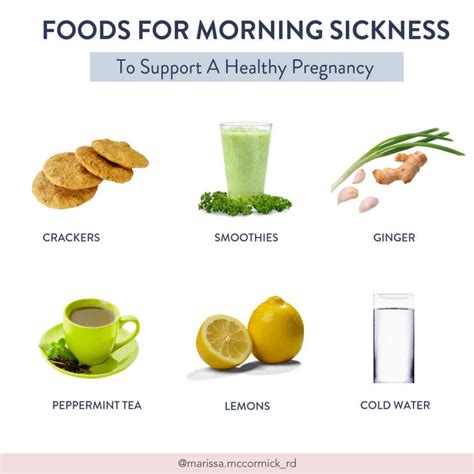Intro
Discover 7 effective ways to relieve morning sickness, including natural remedies, dietary changes, and lifestyle adjustments to alleviate nausea and vomiting during pregnancy, promoting a healthier morning routine.
Morning sickness is a common symptom experienced by many women during the early stages of pregnancy. It is characterized by feelings of nausea and vomiting, which can be triggered by various factors such as hormonal changes, sensitivity to smells, and dietary habits. While morning sickness can be uncomfortable and debilitating, there are several ways to alleviate its symptoms and make the pregnancy journey more manageable. In this article, we will explore 7 ways to relieve morning sickness, providing valuable insights and practical tips for expectant mothers.
The importance of addressing morning sickness cannot be overstated. Not only can it affect a woman's quality of life, but it can also impact her nutritional intake, leading to potential complications during pregnancy. Furthermore, morning sickness can be a source of anxiety and stress, which can have negative effects on both the mother and the developing fetus. By understanding the causes of morning sickness and implementing effective coping strategies, women can reduce their symptoms and enjoy a healthier, more comfortable pregnancy.
Morning sickness is a complex condition, and its symptoms can vary from woman to woman. While some may experience mild nausea and vomiting, others may suffer from more severe symptoms, including dehydration and weight loss. To effectively manage morning sickness, it is essential to identify its underlying causes and develop a personalized plan to alleviate its symptoms. This may involve making dietary changes, practicing relaxation techniques, and seeking support from healthcare providers and loved ones. By taking a proactive approach to morning sickness, women can reduce their discomfort and focus on the joy and excitement of their pregnancy.
Understanding Morning Sickness

Causes of Morning Sickness
The causes of morning sickness are complex and multifaceted. Some of the key factors that contribute to its development include: * Hormonal changes: The increase in hCG and other hormones during early pregnancy can stimulate the brain's vomiting center, leading to feelings of nausea and vomiting. * Sensitivity to smells: Many women experience a heightened sense of smell during pregnancy, which can trigger morning sickness symptoms. * Dietary habits: Eating spicy, fatty, or high-fiber foods can exacerbate morning sickness symptoms. * Stress and anxiety: Emotional stress and anxiety can worsen morning sickness symptoms, creating a vicious cycle of discomfort and distress.Dietary Changes to Relieve Morning Sickness

Foods to Avoid During Morning Sickness
While dietary changes can help alleviate morning sickness symptoms, there are certain foods that can exacerbate discomfort. Some of the foods to avoid during morning sickness include: * Spicy foods: These can irritate the stomach and worsen nausea and vomiting. * Fatty foods: These can slow down digestion and worsen morning sickness symptoms. * High-fiber foods: These can be difficult to digest and worsen morning sickness symptoms. * Caffeine: This can increase urine production and worsen dehydration.Relaxation Techniques to Relieve Morning Sickness

Benefits of Relaxation Techniques
Relaxation techniques can have numerous benefits for women experiencing morning sickness. Some of the key benefits include: * Reduced stress and anxiety: Relaxation techniques can help women manage their emotions, reducing stress and anxiety. * Improved sleep: Relaxation techniques can help women fall asleep faster and sleep more soundly. * Increased feelings of calm: Relaxation techniques can help women feel more calm and relaxed, reducing morning sickness symptoms. * Improved overall health: Relaxation techniques can help women promote overall health and well-being, reducing the risk of complications during pregnancy.Other Ways to Relieve Morning Sickness

Importance of Support
Support is essential for women experiencing morning sickness. Some of the key reasons why support is important include: * Emotional support: Support from loved ones can help women manage their emotions, reducing stress and anxiety. * Practical support: Support from loved ones can help women with daily tasks, reducing fatigue and discomfort. * Medical support: Support from healthcare providers can help women manage their morning sickness symptoms, promoting a healthier pregnancy. * Community support: Support from other women who have experienced morning sickness can provide valuable insights and advice, helping women feel less isolated and more supported.Conclusion and Next Steps

As you conclude this article, we invite you to share your thoughts and experiences with morning sickness. Have you found any effective strategies for managing your symptoms? What challenges have you faced, and how have you overcome them? By sharing your story, you can help other women who are experiencing morning sickness, providing valuable insights and support. Remember, morning sickness is a temporary condition, and with the right approach, you can reduce your symptoms and enjoy a healthier, more comfortable pregnancy.
What are the most common symptoms of morning sickness?
+Morning sickness symptoms can vary from woman to woman, but common symptoms include nausea, vomiting, fatigue, and sensitivity to smells.
How long does morning sickness typically last?
+Morning sickness typically lasts throughout the first trimester of pregnancy, but it can persist in some women until the 20th week of pregnancy.
What are some effective ways to relieve morning sickness symptoms?
+Effective ways to relieve morning sickness symptoms include making dietary changes, practicing relaxation techniques, getting plenty of rest, and seeking support from loved ones and healthcare providers.
Can morning sickness be a sign of a healthy pregnancy?
+Yes, morning sickness can be a sign of a healthy pregnancy. Research suggests that women who experience morning sickness are less likely to miscarry and more likely to have a healthy baby.
When should I seek medical attention for morning sickness?
+You should seek medical attention for morning sickness if you experience severe vomiting, dehydration, or weight loss. You should also seek medical attention if your morning sickness symptoms persist beyond the 20th week of pregnancy.
